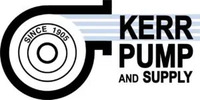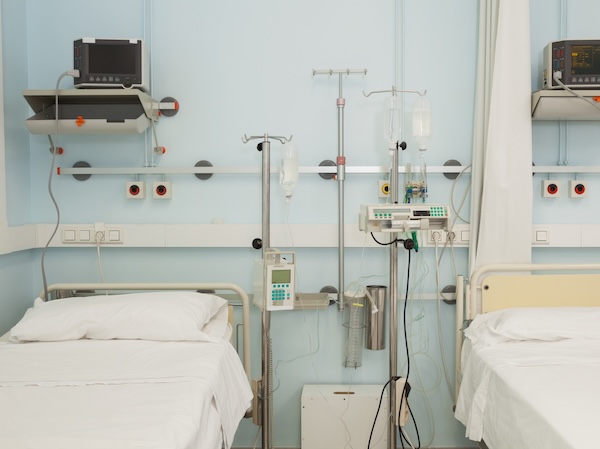What Does a Medical Vacuum Pump Do?
The role of a medical vacuum pump is to generate and maintain a controlled source of vacuum in healthcare facilities. This specialized piece of equipment plays a crucial role in various medical applications by providing a reliable source of vacuum so medical procedures can be performed safely and effectively. Medical vacuum systems must meet strict safety and regulatory standards to ensure patient well-being.
Uses of a Medical Vacuum System
Medical vacuum systems are used throughout healthcare facilities for fundamental applications in surgery, patient recovery and Waste Anesthesia Gas Disposal. Central medical vacuum systems are used to provide vacuum to numerous wall inlets in many hospitals and medical facilities.
These medical vacuum systems are fundamental for:
-
delivering vacuum pressure for aspiration of liquids, gasses and residues
-
ensuring the safety and efficiency of patient rooms and surgery rooms
-
suctioning fluids during surgery
-
performing wound care
-
draining lungs
-
collecting and removing fluids
-
supporting dedicated waste anesthesia (WAGD) systems
-
supporting Dual Use for surgical vacuum and WAGD applications
In general, medical vacuum pumps facilitate patient care in numerous ways while keeping medical professionals safe from potentially harmful substances.
Medical Vacuum Pump Types
Because of the unique nature of medical environments, two main types of vacuum pump technology are recommended for medical vacuum systems: rotary claw or lubricated rotary vane. Each has its advantages.
Rotary Claw Vacuum Pumps
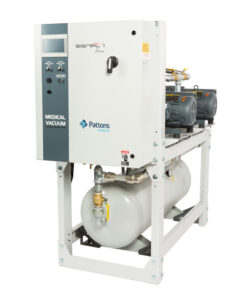
A rotary claw vacuum pump gets its name from two claw-shaped rotors that take in air as they rotate in opposite directions within the pump housing, compressing the air and discharging it through the silencer. The rotors do not contact each other, which eliminates internal wear and parts replacement. And the pumping chamber is dry.
Rotary claw technology offers these advantages when used in a medical vacuum pump system:
-
Dry and extremely efficient pump technology
-
Very low maintenance
-
Elimination of water and sewage costs
Rotary claw vacuum pumps are available optionally with an O2 safe design or with an optional Variable Speed Drive (VSD) for energy efficiency and noise reduction; however, due to cost of the pump and oil, it is not recommended too often due to the makeup of the standard claw.
Lubricated Rotary Vane Vacuum Pumps
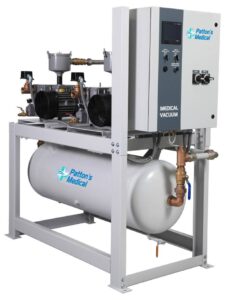 Lubricated rotary vane vacuum pumps feature an eccentrically mounted rotor with several slots that rotates in the pump cylinder. As the rotor turns, centrifugal force causes precisely fitting sliding vanes move outward against the cylinder wall into the slots that separate the individual working chambers.
Lubricated rotary vane vacuum pumps feature an eccentrically mounted rotor with several slots that rotates in the pump cylinder. As the rotor turns, centrifugal force causes precisely fitting sliding vanes move outward against the cylinder wall into the slots that separate the individual working chambers.
Lubricated rotary vane technology offers these advantages when used in a medical vacuum pump system:
-
Air cooled design
-
Lowest Initial Cost
-
Long vane life
-
Elimination of water and sewage costs
-
Deep vacuum level
-
Quiet operation
Medical Air Systems
Medical air compressors are often used in conjunction with vacuum systems in healthcare settings. An efficient medical air system is used for important applications such as:
-
Patient breathing
-
Air filtration in duct systems
-
Powering lab equipment
Medical Scroll Compressors
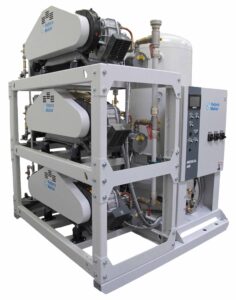 Medical scroll air compressors are widely recommended for a medical air system because they provide consistent 100% oil-free air. These compressors use two spiral shaped scrolls to compress the air in multiple phases as it passes through one air pocket to another. They are ideal for medical environments, which require low noise levels and small footprints for tight spaces.
Medical scroll air compressors are widely recommended for a medical air system because they provide consistent 100% oil-free air. These compressors use two spiral shaped scrolls to compress the air in multiple phases as it passes through one air pocket to another. They are ideal for medical environments, which require low noise levels and small footprints for tight spaces.
Medical scroll compressors are often recommended for multiple reasons:
-
Oil-less operation
-
Low noise level
-
Compact design
-
Energy efficiency at partial loads compared to some other compressor types
-
Reliability
-
Low maintenance design
-
Meet or exceed NFPA 99 requirements
Medical scroll compressor packages include desiccant dryers, filters, dewpoint monitors, and CO monitors to meet NFPA 99 requirements.
Surgical Vacuum Pump Rental vs Purchase
When deciding whether to rent or buy a surgical vacuum pump, take into account factors such as cost and customization, as well as how soon and how long the pump will be needed.
Rental vacuum pumps are often required if a hospital’s vacuum pump is being replaced and used in a tie-in situation and medical vacuum pump rentals are often more economical for this type of short-term vacuum pump use. The main reasons for renting a medical vacuum pump include:
-
To eliminate down time during a tie-in situation.
-
As an emergency replacement for a failed unit
-
As a temporary solution if the current system is determined to be out of NFPA compliance
-
When a standby is needed during construction
Apart from these instances, buying a medical vacuum pump is usually more economical in the long run, especially if the medical vacuum system is used frequently.
How to Select and Size a Medical Vacuum Pump
When selecting a new vacuum pump for your facility, the entire system (including multiple vacuum pumps, a receiver, and control panel) must meet the specific requirements of each hospital to fully comply with the latest edition of NFPA99.
Sizing a medical vacuum pump requires calculating the number of outlets that the system will serve, different flow rates for different outlets and taking into consideration that all outlets may be used at the same time. Kerr Pump and Supply teams up with Pattons Medical to determine the best fit for each facility.
Kerr Recommended Medical Vacuum Pumps and Air Compressors
Kerr recommends Pattons Medical vacuum pumps and medical air compressors for healthcare applications. Pattons Medical equipment is NFPA 99 compliant, and their medical vacuum systems feature UL 508A approved control panels as well as a unique, standard System Health feature to help monitor medical vacuum system performance.
FAQs
How does a medical vacuum pump system work?
Medical vacuum systems provide sufficient flow and constant, uninterrupted negative pressure required in a healthcare facility.
When is it better to rent vs buy a medical vacuum pump?
In general, renting a medical vacuum pump makes sense for temporary needs, such as when a hospital’s vacuum pump is being replaced and vacuum is needed other than for portable units. Often the most efficient solution is a short-term medical vacuum pump rental for tie-ins.
How do you choose the best medical vacuum pump for your facility?
A medical vacuum pump must be NFPA 99 compliant. Choosing the vacuum pump best suited for your facility requires an assessment of how the vacuum will be used, as well as the size of the facility, number of inlets, and amount of vacuum pressure required.
Contact Kerr Pump and Supply for medical vacuum pump selection assistance.
